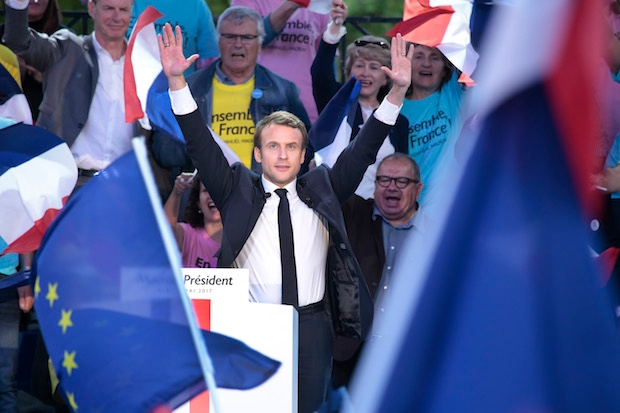There is perhaps some remote mathematical chance that France’s new elected monarch will be struck down by a meteorite before he is officially inaugurated in a grand parade on the Champs Elysée on May 14th, amidst a 21-gun salute, helicopters flying overhead, the Garde Républicaine in full-dress uniform on shining horses, generals posed upright in their ceremonial 4x4s, bands playing, bunting flapping.
Barring that, Mr President, you appear to have played a blinder, winning the keys to the Elysée in what appears to have been a stunning political insurgency, and you have done so promising to reform an immobilised French economy.
Your victory will be hailed as evidence that Europe has overcome the challenge from the extreme right, and that the European project will continue to be at the centre of the French polity, no matter that 55 per cent voted against the European constitution, and more than 50 per cent voted for eurosceptic or Frexit parties in the first round of the election. If there seems to be a contradiction here, it is one we shall have the chance to examine shortly. But for now, it is a fairytale as the teacher’s pet from Amiens ascends to the presidency of the fifth republic.
There will be plenty of time to perform a post-mortem of Marine Le Pen’s challenge and defeat, and it is more nuanced a defeat than it may at first appear. The French left and right have simultaneously imploded, and the hope is that Macron’s movement might establish itself as a genuine centrist party, and not just as one messianic figure at the centre. The chance of a reformation on the French right might be more problematic but Le Pen’s angry voters are not going to disappear.
But come the hour, the story is now all about Macron, the golden boy of the French establishment: what he means, the sometimes curious elements to his character and relationships with others, the gap between promise and performance, and most importantly, what he is able to do, since there must now be a further two-round election for the National Assembly, in June. Expect a blizzard of voter-friendly decrees from President Macron, but serious reforms of legislation are going to depend on a mandate not yet delivered and will have to weather serious contestation.
There are big unanswered questions around all of this, not least precisely how Macron has managed to seize the presidency, given that he represents almost everything a majority of French people do not like. It is not clear that the apparent political earthquake to have riven France is entirely what it seems. Nor has the full story emerged of how Macron got to this position, who helped him, and who paid for it.
For the UK, specifically, this is indeed bad news. He imagines that Britain must pay a €60 billion Brexit fee, showed little grace towards Theresa May when he visited her at Downing Street, and armchair psychologists suggest he will do exactly what he is told by the Mutterfigur, Angela Merkel (whose age is not unadjacent to that of his wife, Brigitte, 25 years his senior).
If the last-minute Wikileaks dump tells us anything it is that the Macron campaign was ruthlessly disciplined and had, it appears, thought of everything. The issue-by-issue position papers were slick, well-considered and comprehensive. Perhaps there will be some embarrassing documents to be revealed as a detailed trawl of the cache gets underway, but the blindingly obvious is that Macron was supported by a large and expensive back office.
By the end of the week, the list of those who had declared themselves for the two candidates was ludicrously lopsided. The Macron peloton comprised Obama, Merkel, Jean-Claude Juncker, president François Hollande, former president Nicolas Sarkozy, pop-philosopher Bernard Henri-Levy, eco-activist José Bové, Mitterrand counsellor Jacques Attali, 1968 rebel turned euro MP Daniel Cohn-Bendit, the French communist party, all the big unions, all the newspapers, the entire chattering class and Medef, the French industry federation. Marine Le Pen, not so much, beyond Brigitte Bardot.
My focus group at the village café is pretty disgusted with the new president before he has started, considering it improbable that he can deliver even a fraction of what he has promised, but there are a few who are more optimistic that perhaps Macron can definitively unblock a system in which everyone knows there must be change but nobody agrees what it should be. Good luck with that.
As I prepare to go on Sunday morning to the voting station at the Salle du Peuple, where I will help count the votes as part of my duties as an elected councillor (a role that must end, with Brexit), I am not expecting general enthusiasm, even if the turnout is pretty high and the majority for Macron convincing. After France’s multiple failed attempts to establish a durable republic, nothing about this election is going to make go away the fundamental problems of a sclerotic economy, massively unemployed youth, and a terrible security situation and nothing resembling a national consensus other than a rejection of Le Pen.
Jonathan Miller is the author of France a Nation on the Verge of a Nervous Breakdown and tweets @lefoudubaron







Comments